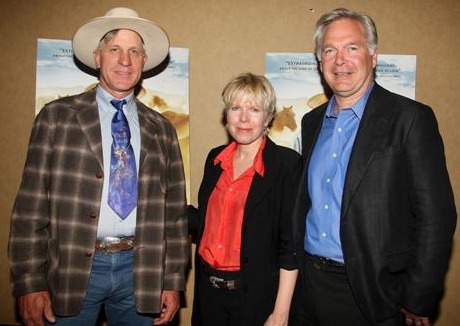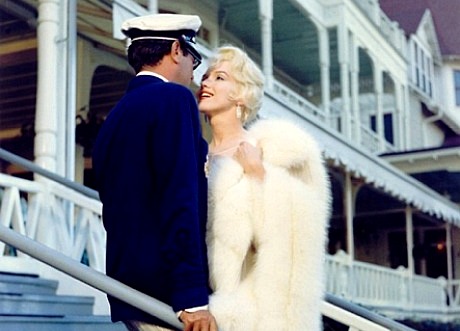I remember a National Lampoon article summarizing the first term of Robert F. Kennedy‘s presidency. The point was that Kennedy would have become a moderately cautious liberal and boilerplate cold warrior, and a far cry from the “change” candidate that RFK ran as. Like someone else I could mention. Promise and potential are eternally attractive, but nobody’s a miracle worker. Reality will always compromise the dream.
Daily
The Weakening
There’s obviously very little new material in this Cowboys & Aliens trailer. It’s the same old iconic-western-characters-and-situations-in-quotes crap with alien craft zooming overhead….so what? Is this movie (out 7.29) holding any face cards, or is at all genre-goof razmatzzz? How many times are we going to be shown the same shot of Olivia Wilde standing naked in front of a bonfire?
Good Favor
There can’t be too many who haven’t seen through Sarah Palin by now. She’s a conniving, under-educated opportunist, living in a walled-off realm and out for whatever money and power she can grab by playing the part of a right-wing Annie Oakley bigmouth (and sex symbol). It’s good to hear nonetheless that Nick Broomfield has been working on a presumably anti-Palin documentary, and that the negligible political effect of The Undefeated (which will open exclusively at several hinterland AMC theatres on 7.15) will be counterbalanced to some extent. The Broomfield doc was written about last night by L.A. Times Stephen Zeitchik.
Tell It
Now that Super 8 is semi-officially “overperforming” with a reported $12 million earned Friday and a projected $35 million by Sunday night (i.e., $4 million more than what Boxoffice.com’s Phil Contrino predicted two days ago) and averaging roughly $10,358,000 at 3,379 locations, what are the reactions from those who saw it today?
Dylan and Buck
Last Tuesday night HE Manhattan correspondent Dylan Wells caught Cindy Meehl‘s Buck (Sundance Selects, 6.17). “What stands out,” he reports, “is not the indisputable charm of Buck Brannaman or the harrowing story of his childhood. Nor the beautiful photography or even the numerous laughter and heart moments.

Buck Brannaman, Cindy Meehl and IFC Films’ Jonathan Sehring at last Tuesday night’s (6.7) screening.
“Rather it is the many universal truths that Buck discovered throughout his growth as a prodigal cowboy and horse trainer. Truths that he bestows generously and often in first-time-director Cindy Meehl’s impressive documentary. Truths that deserve a moment’s consideration whether or not you would stand on one foot for a horse.
“‘It never occurred to me to have disdain for a horse,’ Buck explains about an especially troubled stud who’s been brought to one of his clinics. During the film he also passes along some fundamental lessons.
“The behavior of a horse reflects more so upon the owner than the creature itself. Which is why if an owner expects any cooperation from a horse, he/she must first learn what the horse needs in return. You need to see yourself through the eyes of a creature that is first and foremost concerned with its own well-being. If you want the privilege of feeling secure around a conventionally wild animal, then you must do all that is in your power to make sure that animal is spared of any insecurity.
“Watching this feature was a zen-like experience for myself. Perhaps that’s just what I wanted to take from it, or needed to take from it. But based on the very warm reception that the film received from the audience, I don’t think I’m alone.
“Whether it is training a horse, raising a child, or even honing a discipline of your own such as writing, visual arts or engineering, the philosophy of Buck can and should be applied. Know your objective and respect the dangers of resentment, frustration, and impulsive behavior. Treat your goals with the same respect and caution that you would a wild horse, and you are far less likely to get kicked in the mouth.”
Here’s my South by Southwest review, posted on 3.16.11.
Shimmering
When a black-and-white film looks as tonally rich and laser-sharp as the Some Like It Hot Bluray, it becomes something more than just a transfer. It’s something else, a kind of realism-plus…in a sense more pronounced than color. It’s now at the top of my list of the finest black-and-white Blurays ever — even with (and perhaps even a notch better than) Psycho, Casablanca, Sweet Smell of Success and The Treasure of the Sierra Madre.

Three
I realize that David Mamet‘s script for that Phil Spector HBO flick that Barry Levinson and Al Pacino have reportedly agreed to do is in a “very early” stage of development (or at least that N.Y. Times Brooks Barnes reported this eight months ago). But shouldn’t Deadline‘s Michael Fleming have at least mentioned the Spector project in passing while reporting about two other Levinson-Pacino collaborations, Gotti: Three Generations and an adaptation of Phillip Roth‘s The Humbling?
Singular Possessive
Our Idiot Brother sounds wrong because a family of any size never agrees on any particular view or opinion, especially negative ones. Derogatory putdowns are almost always expressed by individuals. One or two members of a family might think Paul Rudd‘s character is an idiot, but three or four others are sure to use another term. The Weinstein Co. should have stuck with My Idiot Brother, which is what it was called at Sundance 2011.

Our Idiot Brother sounds like the whole clan has dismissed Rudd as a tool, and that no one is on his side. That doesn’t sound as interesting as one or two family members having a problem with him and others trying to mitigate or standing by and observing, etc.
Alain Resnais‘ 1980 comedy wasn’t called Notre oncle en Amerique but Mon Oncle d’Amerique.
Assault
Marshall Fine is complaining about having been recently subjected to 20 minutes’ worth of ads and trailers at an AMC theatre prior to showtime. He should try attending a movie in Paris. On 5.27 I sat down just as the 7:45 pm show of Very Bad Trip 2 was starting at the Pathe Wepler, adjacent to Place Clichy. I sat through 27 minutes‘ worth of trailers and consumer ads before the feature began. (I timed it exactly.) The average time for trailers and ads in a typical U.S. theatre is what? 10 or 12 minutes worth?
Old-Fashioned
Like everyone else I’m feeling moderately excited about Tetro dp Mihai Malaimare Jr. not only shooting Paul Thomas Anderson‘s The Master, but partly in 65mm. My understanding of the view of most dps (including Roger Deakins) is that 65mm doesn’t deliver anything above and beyond what today’s digital can provide. So shooting in 65mm is either a sentimental gesture on Anderson’s part or it’s being used to compose FX shots.
